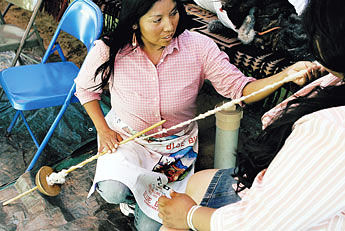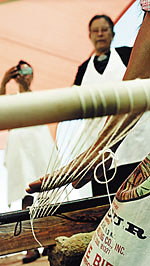|
An elder's message
Grandmother's wish puts woman on traditional
path

Andrethia Bia demonstrates spinning wool at a weaving workshop in
Red Mesa, Ariz. A year ago, Bia learned the weaving process, even
though she was around it for 23 years since the age of 7. She says
she is attempting to hold onto tradition and wants to be able to
pass it on to future generations. [Photo by Daniel Zollinger/Independent]
By Natasha Kaye Johnson
Diné Bureau

Andrethia Bia explains steps to stringing a loom during a weaving
workshop in Red Mesa, Ariz. The string is looped in a figure-eight
pattern. Later, edging cord is woven in to keep distortion from
taking place. [Photo by Daniel Zollinger/Independent] |
RED MESA, Ariz. — Throughout her childhood and
into her early adult years, Andrethia Bia measured her success according
to Western standards.
During her high school career, she was active in an endless list
of extracurricular activities from being vice president of student
council to being a year-round athlete. At 18 years old, she graduated
from Red Mesa High School and accepted a cross country scholarship
to the College of Eastern Utah in Blanding.
As a child, Bia was raised traditionally, and spent most of her
time with her late grandmother Mary Kitseally, helping her with
the sheep and watching her weave. Her childhood was filled the Diné
teachings and philosophy, and she grew up speaking fluent Navajo.
When she graduated, Bia was ready to move away and start a successful
life on the reservation. Thoughts of a degree that could lead to
a blossomed career, and eventually a two-story home and nice vehicles
rested in the back of her mind. She wanted to leave to pursue her
degree, but also to relieve the pressures and responsibilities of
living at home.
"I wanted to move away because I felt like everybody relied
on me," Bia said. "I wanted to go into the city."
Bia went on to school and work in the metropolis areas of Utah and
Arizona for the next 10 years following high school. Among other
things, she worked as a teacher at the Salt River reservation. She
surrounded herself with other Navajos and Native Americans, and
stayed busy with work and her two boys. But something kept bothering
her.
"There was a part of me that wasn't right," Bia said.
Childhood memories, like herding sheep and picking herbs with her
grandmother, stayed vivid in her memory and she yearned to be back.
"She was always in my mind," Bia said. "I wanted
to live back in my homeland."
After over 10 years of the hustle and bustle of the city, she was
ready to come home. The city just didn't fit anymore, and she wanted
to begin relearning her traditions and teaching her own children.
Adjusting and relearning
Bia admits that the adjustment back home was difficult.
"There's a lot of opportunities there (in the city),"
Bia said. "It's just so easy to move out there."
But when Bia did return, she decided that she would begin weaving,
just as her mother and grandmother had. But being able to weave
was not just the only thing that she wanted to do. It was three
years ago when she began longing for a deeper understanding of Navajo
philosophy.
"Who is White Shell woman? Who is Changing Woman? What is the
difference? What is 'iina'?" Bia, who is now 30 years old,
asked. "There was a part of me urging for that kind of knowledge.
I always helped, but I never put myself into it," she remembers.
She began talking to elders and decided to take classes at Diné College
to learn as much as she could. She started weaving a little over
a year ago, and began taking weaving classes at the college.
"When I started school at Diné College, I had a connection there,"
Bia said.
A special dream
Though the adjustment back was not easy, one night she became completely
convinced that her decision to come back was the right one. Her
decision to return was reaffirmed when she had a dream about her
grandmother, Mary.
In January, Bia's grandmother came to her in her dream. At the time,
her grandmother was in a nursing home. Bia vividly remembers giving
her grandmother a hug, and talking to her in Navajo, expressing
how happy she was to see her. The dream came to Bia during a time
when she was having a hard time with her loom, and had to take it
apart more than ten times to try and fix it.
In Navajo, Bia's grandmother explained the reason she came to her.
"The reason I came to is because I am waiting for your rug,"
Bia remembers her saying.
Her grandmother went on to say that it made her happy that is learning
to weave. She also told her granddaughter that she would continue
her journey onto the next world once she finished the rug.
"This was my dream," Bia recalled, as she cried and wiped
her eyes.
Bia said she didn't want to finish the rug after the dream, and
was scared that her grandmother would pass if she finished. She
shared the dream with her mother, and confided in weaving teacher
at Diné College about what to do. Her teacher told her that she needed
to visit her grandmother and tell her about the dream.
"I went to go see my grandma, and I told her I cannot finish
the rug," Bia said.
Bia explained the dream to her grandmother, and then broke down,
telling her grandma that she wished she would have picked up her
teachings earlier.
"I felt that it was too late for me," she said. But her
grandmother reassured her that everything was OK, and as it should
be.
"She massaged my hand and said it's OK, you're going to learn,"
Bia said as she cried, recalling the day she visited her grandmother
in the nursing home. A month later, her grandmother passed away,
just shortly after Bia completed her rug. Her aunts decided that
Bia would keep her weaving tools and her loom.
"For me that's a blessing," she said.
Thankful to be home
Thinking back, Bia admits thinking that Navajo culture and philosophy
was of minimal importance. Now, it has become the center of her
focus.
"If I don't understand, I pray about it," Bia said. "I
think that's what she (her grandmother) wanted me to do."
Along with learning the traditional songs that go with weaving,
she is a full-time student pursuing elementary education, and works
full-time for the Navajo Nation Park Service. She is also working
on a business plan to start a bed and breakfast. But the best moments
her day come when she can spend time with elders, and her children.
"They (elders) want somebody around them to share their philosophy
with them," Bia said. "I'm not embarrassed to say I started
(learning) last year. You're never too old, and it's never too late."
"I'm very proud of my daughter," Bia's mother, Ethel Bia,
said. She believes that her daughter's dream about her mother was
very special, and was a gift.
"We have to rely on our Navajo philosophy," Ethel Bia
said. "That's our income."
Ethel Bia was happy when her daughter and grandchildren finally
came home. "We (family) said don't be living in Phoenix your
whole life," Ethel Bia remembers telling her daughter. "She's
doing that for her family, her community, and for her people, and
not only herself."
|
Monday
July 2, 2007
Selected
Stories:
Water leak
wreaks havoc; Roadway buckles, water service cut
Navajo VP can't
drive 55; Cited by NN police for doing 92 mph
Chile cookoff
heats up Pueblo of Acoma
An elder's
message; Grandmother's wish puts woman on traditional path
Deaths
|



